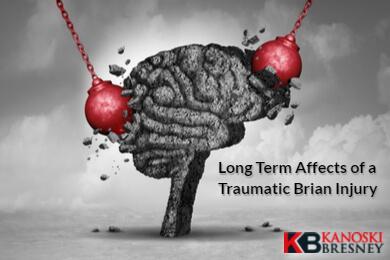How Can Brain Injuries Affect a Victim’s Long-Term Health?

A blow to the head can result in serious brain injuries. These injuries may occur in car accidents, slip-and-fall accidents, construction accidents, and a wide variety of other situations. Unfortunately, these injuries are not always well-understood, and a person may not experience symptoms immediately after an accident. However, the effects of a traumatic brain injury (TBI) can persist for multiple months or years, or they may even lead to permanent impairments that affect a person’s health, their relationships with others, and their ability to maintain employment. By understanding these effects, a brain injury victim can work with an attorney to determine their best options for recovering financial compensation.
Long-Term Effects of Traumatic Brain Injuries
In many cases, the immediate aftermath of a head injury will involve headaches and other forms of pain, dizziness, and memory loss. These issues often last for a temporary period of time, but if they persist for multiple months or years, they can drastically affect a person’s quality of life. Persistent, chronic headaches can be debilitating, and they may be accompanied by issues such as ringing in the ears or sensitivity to loud noises or bright lights.
In some cases, memory loss may be accompanied by other cognitive impairments that affect a person’s ability to communicate with others and participate in daily activities. The inability to remember and act on information may make it difficult or impossible for a person to return to the work-related activities they could perform prior to being injured. A person may also struggle with understanding other people’s speech, forming words, or expressing their thoughts, and this can not only affect their employment, but can also impact their personal relationships.
The dizziness that a person may experience following a head injury can develop into severe problems with balance and coordination. A person may struggle to maintain control over different parts of their body, or they may be unable to walk and move about without assistance.
Mood disorders and emotional issues may also be an ongoing problem for a person who has experienced a traumatic brain injury. A person may experience increased irritability or difficulty regulating emotions such as anger or sadness. Depression and anxiety are also common for those who have suffered brain injuries, and depending on the circumstances surrounding the injury, a person may also suffer from post-traumatic stress disorder (PTSD).
Sleep disorders are another common concern following a brain injury. Because of issues such as headaches or ringing in the ears, a person may have difficulty falling asleep, or they may experience insomnia that is unrelated to other symptoms. In other cases, a person may require more sleep than usual, or they may suffer from sleep apnea or struggle to wake up at the right times. These issues can cause severe fatigue that affects a person’s ability to participate in daily activities.
Contact Our Springfield Traumatic Brain Injury Attorneys
If you have suffered a brain injury that was caused by someone else’s negligence, Kanoski Bresney can help you take steps to pursue compensation that will fully address the ways your life has been affected and ensure that you can make a full recovery. Contact our Champaign brain injury lawyers today at 888-826-8682 to arrange your complimentary consultation.
Sources:
https://www.mayoclinic.org/diseases-conditions/traumatic-brain-injury/symptoms-causes/syc-20378557
https://www.brainline.org/article/what-impact-will-moderate-or-severe-tbi-have-persons-life
https://www.flintrehab.com/long-term-effects-of-mild-traumatic-brain-injury/









